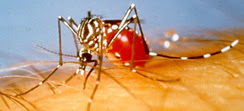Aedes aegypti mosquito,
very distinctive and easily recognized
very distinctive and easily recognized
Dengue fever is a viral disease which affects more than 100 million people each year in tropical and subtropical areas.
It is caused by a bite from an infected Aedes aegypti mosquito, a day biting mosquito, which prefers to be indoors and is likely to bite the feet or ankles. Dengue is also less commonly caused by the Aedes albopictus mosquito, also known as the Asian tiger. The mosquitoes become infected when they bite an infected person. Dengue cannot be transmitted person to person.
Dengue is widespread in much the same areas where malaria is prevalent. The dengue mosquito can be identified by the white stripes on its black legs.
La Prensa has been reporting a dengue epidemic in Honduras for several weeks now. In the first 6 months of 2007, more than 6,000 cases of dengue classico have been reported, primarily in Tegucigalpa, San Pedro, and Puerto Cortés. That figure is almost double the number of cases reported in 2006. Keep in mind, though, that many people can't afford to see a doctor, don't have access to a public hospital, or are too catracho-macho to see a doctor, so my guess is that the number of cases is actually much higher.
As of last weekend, Hondurans have experienced 297 confirmed cases of dengue hemorragico (DH), which is also almost double the number of cases that occurred in 2006, and 5 deaths from DH. Since currently the death rate is "only" 1.6%, the alert is still being classified as a green alert. It won't be changed to a red alert unless the death rate gets to 5% of the cases.
Cases are confirmed by sending blood samples to the U.S. Center for Disease Control (CDC) in Atlanta for diagnosis. As a result of the delay, the number of suspected cases is usually much higher than the number of confirmed cases.
I don't think that I need to translate hemorragico and I'd rather not get into that. Just use your (worst) imagination or see the US National Institute for Health or CDC sites if you want to know more. Dengue is relatively rare in the U.S. and most U.S. cases can be traced back to a trip to a tropical country.
 No treatment, no cure, and no vaccine are available for dengue fever. You get it, you feel like you are going to die (and want to), and then you get over it − usually between 3 and 7 days.
No treatment, no cure, and no vaccine are available for dengue fever. You get it, you feel like you are going to die (and want to), and then you get over it − usually between 3 and 7 days.There is no cure or vaccine for the potentially deadly dengue hemorragico either but hospital care is needed to keep the patient alive with fluid replacement therapy and possibly blood transfusions until he recovers. Since the symptoms are pretty much the same for both diseases in the beginning stages, it is important to see a doctor to be tested.
The good news is that once you get dengue you develop an immunity to that type; the bad news is that there are four types, and each of them can develop into DH.
A dengue education campaign is ongoing in Honduras. La Prensa does a very good job of educating people and I'm sure the other newspapers do, too, as does television and radio. The primary prevention is to eliminate all sources of standing water and soggy soil which provide a breeding ground for the mosquito larvae. The mosquito doesn't travel far in its lifetime, so keeping your own home and property free of breeding areas will help to keep you safe.
 This, however, is difficult to impossible to do in some poor colonias with rutted dirt roads, open sewers and ditches with standing water.
This, however, is difficult to impossible to do in some poor colonias with rutted dirt roads, open sewers and ditches with standing water.Trash, believe it or not, is a big threat because all that plastic trash holds rainwater and provides a perfect, protected breeding area. So, that is one very important reason why this culture of littering and dumping trash everywhere needs to stop!
The ever present open pilas (concrete laundry sinks) filled with stored water are another big issue. The government sometimes provides abate to add to the water in pilas to kill the larvae. The government also fumigates some houses in the worst affected areas. The CDC says that this spraying is a relatively ineffective way to control the mosquito. The CDC's Dengue Fact Sheet can be viewed in PDF format here.

I have had dengue but I'll spare you the details. It was terrible. Dengue is not something I worry about. I have enough to worry about and if I had to worry about the possibility of one infected mosquito getting into my house, I'd drive myself crazy. There is no way to keep an airtight house with the kind of windows we have here.
If I was coming to Honduras on vacation, I would probably use Deet even though I hate using it and normally don't. But I can't live my life covered with Deet. So, I'm taking the Honduran approach and saying, ¡si Dios quiere! (if God wills it!). After all, I'm already one down and only three to go.



 Welcome to my Blogicito —
Welcome to my Blogicito — 







